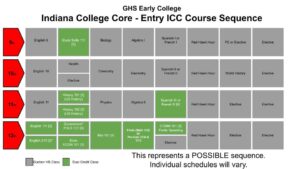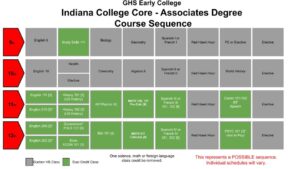
RedHawk University is a place for all Goshen High School students regardless of their chosen pathway. We hope every student who graduates from Goshen High School will have taken advantage of the amazing opportunities that RedHawk University is offering.
RedHawk University
| Graduation Requirements | Graduation Pathway Options |
| #1 High School Diploma | Meet the Indiana state-defined diploma credits and curricular options. View more information on diplomas here. |
| #2 Employability Skills | Students must complete at least one of the following:
|
| #3 Postsecondary-Ready Competencies |
|
- Indiana University (all sites)
- Purdue University (all sites)
- Ball State
- IUPUI
- University of Southern Indiana
- Indiana State University
- 30 Credit Hours must be earned from classes offered on the Indiana College Core.
- Students must earn at minimum 3 credit hours in each of the 6 categories on the Indiana College Core (Written Communication, Speaking and Listening, Quantitative Reasoning, Scientific Ways of Knowing, Social and Behavioral Ways of Knowing, and Humanistic and Artistic Ways of Knowing).
- The maximum credit hours for each of the 6 categories allowed is 12 credit hours (ie., even if a student earns 15 credit hours in the Scientific Ways of Knowing category, only 12 of those credit hours will count towards the 30 credits needed to earn the Indiana College Core).
- At a minimum, 15 of the 30 credit hours needed to earn the Indiana College Core must come from Ivy Tech dual credit courses or traditional classes to meet Ivy Tech residency requirements.
- Students must earn, at minimum, a 2.0 GPA in their dual credit classes that are part of the Indiana College Core in order to be awarded the Indiana College Core.
- ENGL 111 English Composition - 3 credits
- ENGL 215 Rhetoric and Argument - 3 credits
- COMM 101 Fundamentals of Public Speaking - 3 credits
- COMM 102 Introduction to Interpersonal Communication - 3 credits
- Math 135 Finite Math - 3 credits
- MATH 136 College Algebra - 3 credits
- Math 137 Trig with Analytic Geometry - 3 credits
- Math 211 Calculus I - 3 credits
- BIOL 101 Introductory Biology - 3 credits
- ECON 101 Economics Fundamentals - 3 credits
- HIST 101 Survey of American History I - 3 credits
- HIST 102 Survey of American History II - 3 credits
- POLS 101 Intro to American Government and Politics - 3 credits
- PSYC 101 Introduction to Psychology - 3 credits
- ENGL 202 Creative Writing - 3 credits (Available in SY 2024-25)
- ENGL 206 Introduction to Literature - 3 credits (Available in SY 2024-25)
- FREN 101 French Level I - 4 credits
- SPAN 101 Spanish Level I - 4 credits
Early College Program – Where Ability Meets Opportunity!
So, you are going to college! You have the grades, the drive, and the confidence that you will succeed! However, are you concerned about your ability to meet the demands of the coursework, have the time-management skills, or are the first in your family to attend college? Some college-bound students need some extra support to get started down this path. The RedHawk University Early College program will provide students with a structured system of enhanced support to accompany the increased rigor of college classes. It’s where a student’s ability meets opportunity!
- Being a first-generation college student
- They have socioeconomic barriers
- They have moderate academic challenges
- Targeted Student Population
- Underserved - first generation, different ethnicities, socioeconomic barriers
- "Middle of the pack"
- Curriculum and Plan of Study
- Designated pathway(s) leading to General Education certificate or associate’s degree
- The grade 9-10 core curriculum lays the foundation for grade 11-12 dual credit
- College-Going Culture
- Create a “sense of place” for the Early College
- Students need to visit college campuses!
- Rigorous Instruction
- Preparing students to be able to handle the challenges of post-secondary education
- Increase rigor in high school courses
- Supports for Student Success
- Build a grade 9-12 continuum of supports
- Attend to academic, social, and emotional needs
- Focus on high school success, then college
- Collaboration & Partnerships
- Strong relationship with higher education partner(s)
- Efforts to involve community & area businesses in supporting EC
- Leadership & Staffing
- Passionate about this model, these students
- Defined roles & responsibilities, collaborative
- Data Collection, Analysis, & Use
- Monitor & adjust all program aspects along the way
- Evaluate overall program effectiveness


